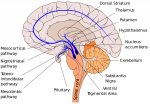pattismith
Senior Member
- Messages
- 3,988
Optogenetic stimulation of the locus coeruleus noradrenergic neurons can increase wakefulness, and high-frequency stimulation decreases noradrenaline levels and produces loss of muscle tone similar to that seen in cataplexy.
We suggest that the noradrenergic system functions to couple the brain systems that control postural muscle tone and behavioral arousal state.
Postural muscle tone is potently suppressed during sleep and cataplexy. Since brainstem noradrenergic cell discharge activity is tightly coupled with state-dependent changes in muscle activity, it is assumed that noradrenergic drive on to somatic motoneurones modulates basal muscle tone.
However, it has never been determined whether noradrenergic neurotransmission acts to directly regulate motoneurone activity or whether it functions to modulate prevailing synaptic activity. This is an important distinction because noradrenaline regulates cell excitability by both directly depolarizing neurones and by indirectly potentiating glutamate-mediated excitation.
...
Our data indicate that exogenous noradrenergic drive does not directly affect spontaneous motoneurone discharge activity in anaesthetized rats; rather, it triggers postural muscle tone by amplifying prevailing glutamate-driven excitation.
Noradrenaline triggers muscle tone by amplifying glutamate-driven excitation of somatic motoneurones in anaesthetized rats - PubMed (nih.gov)
2008
A Noradrenergic Mechanism Functions to Couple Motor Behavior with Arousal State - ScienceDirect
2013
Illuminating the locus coeruleus: control of posture and arousal | Nature Neuroscience
2010
A good Postural Muscle Tone is needed for a good standing posture!

